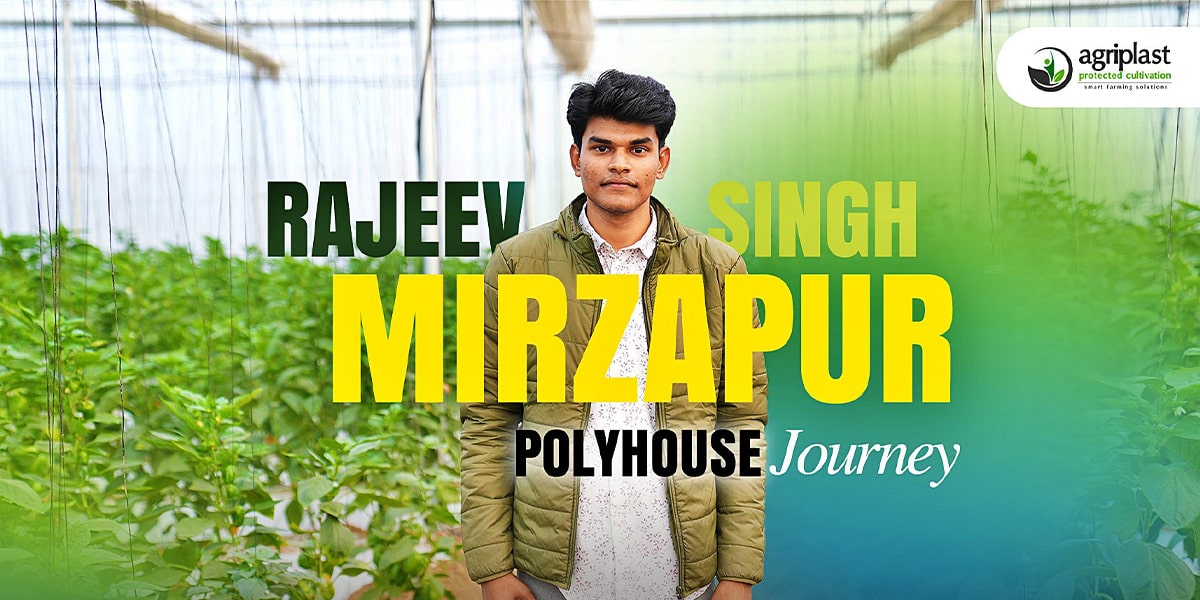Agriplast's Protected Cultivation Solutions: Shaping the Future of Small-Scale Farming
Small-scale farming plays a crucial role in feeding local communities, preserving agricultural biodiversity, and promoting sustainable livelihoods. However, small-scale farmers face numerous obstacles, including climate change, diminishing resources, and market competition, which can threaten their productiveness and long-term viability. Adopting innovative farming practices, such as those offered by Agriplast Protected Cultivation's protected cultivation structures - polyhouses, greenhouses, net houses, and poly tunnel structures - can help small-scale farmers overcome these challenges and unlock a wealth of opportunities for growth and development.

Small-scale farming plays a crucial role in feeding local communities, preserving agricultural biodiversity, and promoting sustainable livelihoods. However, small-scale farmers face numerous obstacles, including climate change, diminishing resources, and market competition, which can threaten their productiveness and long-term viability. Adopting innovative farming practices, such as those offered by Agriplast Protected Cultivation's protected cultivation structures - polyhouses, greenhouses, net houses, and poly tunnel structures - can help small-scale farmers overcome these challenges and unlock a wealth of opportunities for growth and development.
In this post, we will explore the potential benefits of incorporating Agriplast Protected Cultivation's protected cultivation solutions into small-scale farming operations and examine their implications for local communities. By embracing the advancements in agricultural technology offered by Agriplast Protected Cultivation's structures, small-scale farmers can optimize crop growth, enhance efficiency, improve financial stability, and foster greater sustainability.
Join us as we delve into the potential of Agriplast Protected Cultivation's protected cultivation structures to revolutionize small-scale farming and local food systems, empowering farmers to build sustainable businesses while strengthening the fabric of their communities.
Year-Round Cultivation: Maximizing Crop Yields and Farm Profitability
One of the most significant benefits of Agriplast Protected Cultivation’s protected cultivation structures is the ability to grow crops year-round, regardless of external weather conditions. By utilizing advanced climate control systems within their polyhouses and greenhouses, small-scale farmers can maintain optimal temperature, humidity, and light conditions, providing a suitable growing environment for a wide range of crops throughout the year.
Year-round cultivation offers several advantages for small-scale farmers:
1. Increased Crop Yields: Growing crops year-round, without interruptions due to unfavorable weather or climatic conditions, leads to higher overall productivity and harvest volumes.
2. Diversified Crop Selection: Year-round cultivation allows farmers to grow multiple crop cycles or experiment with new crop varieties that may typically struggle in their region's climatic conditions.
3. Enhanced Farm Profitability: With increased crop yields and reduced losses due to weather factors, small-scale farmers can improve overall farm profitability and secure a stable financial future.
Optimized Resource Management: Irrigation and Fertigation Technologies
Agriplast Protected Cultivation’s protected cultivation structures often incorporate advanced irrigation and fertigation technologies, which can effectively optimize water and nutrient management and conserve precious resources.
The benefits of these advanced technologies include:
1. Efficient Water Use: Precision irrigation methods, such as drip and micro-sprinkler systems, ensure optimal water delivery to crops and minimize water waste.
2. Precise Nutrient Application: Fertigation systems enable farmers to deliver precise nutrient concentrations directly to plant root zones, promoting efficient absorption and reducing the likelihood of nutrient leaching or runoff.
By adopting these resource-saving technologies, small-scale farmers can reduce input costs, minimize environmental impact, and maintain crop quality.
Improved Produce Quality and Market Opportunities
By cultivating crops in a protected environment, small-scale farmers can significantly enhance the quality of their produce, ultimately increasing its market value and competitiveness.
The potential benefits of growing high-quality produce within Agriplast Protected Cultivation's protected cultivation structures include:
1. Improved Customer Appeal: Consistent, high-quality produce is more attractive to consumers and is likely to command premium prices in the market, leading to better income generation for the farmer.
2. Expanded Market Access: Farmers growing diverse, high-quality produce in protected structures can tap into niche markets, such as organic produce or specialty crops, which typically have higher profit margins.
By focusing on improved produce quality and market opportunities, small-scale farmers can elevate their farm operations and bolster their overall profitability.
Sustainability and Eco-Friendly Agriculture
Agriplast Protected Cultivation’s protected cultivation structures not only contribute to increased productivity and efficiency but also support environmentally sustainable farming practices. Some key aspects of sustainable agriculture that can be enhanced through the adoption of these protected cultivation solutions include:
1. Water Conservation: Advanced irrigation technologies incorporated into Agriplast Protected Cultivation's structures enable farmers to use water resources more efficiently, ultimately reducing the pressure on local water sources and conserving an essential natural resource.
2. Reduced Chemical Applications: Cultivating crops in a protected environment often minimizes the need for chemical pesticides, herbicides, or fungicides, contributing to healthier ecosystems and reduced environmental contamination.
3. Soil Conservation: Protected cultivation structures help preserve soil quality by reducing soil erosion, compaction, and nutrient depletion, maintaining the overall health of agricultural lands.
By adopting sustainable and eco-friendly agricultural practices within Agriplast Protected Cultivation’s protected cultivation structures, small-scale farmers can actively contribute to a cleaner, healthier, and more responsible food production system.
Conclusion:
The potential benefits of incorporating Agriplast Protected Cultivation’s protected cultivation structures into small-scale farming operations are immense. From maximizing crop yields and optimizing resource management to improving produce quality and market opportunities, adopting these innovative farming solutions can significantly enhance the resilience, profitability, and long-term viability of small-scale farming enterprises.
Additionally, by embracing the environmentally sustainable farming practices enabled by Agriplast Protected Cultivation's protected cultivation structures, small-scale farmers can contribute to the preservation of vital ecosystems and the overall well-being of their local communities.
By seizing the opportunity to revolutionize their farming operations with Agriplast Protected Cultivation's protected farming solutions, small-scale farmers can secure a prosperous and sustainable future for themselves, their families, and their communities. Embrace the innovative farming practices offered by Agriplast Protected Cultivation and begin your journey towards a successful and eco-friendly agricultural business today.



















